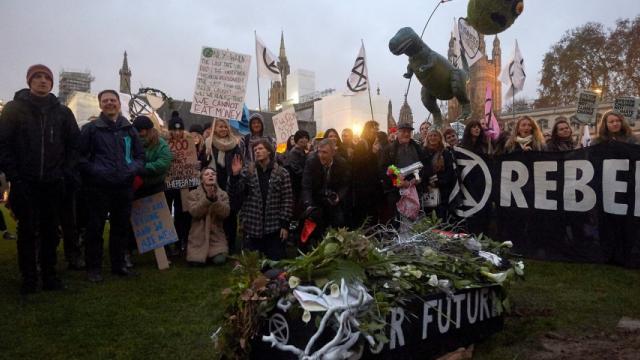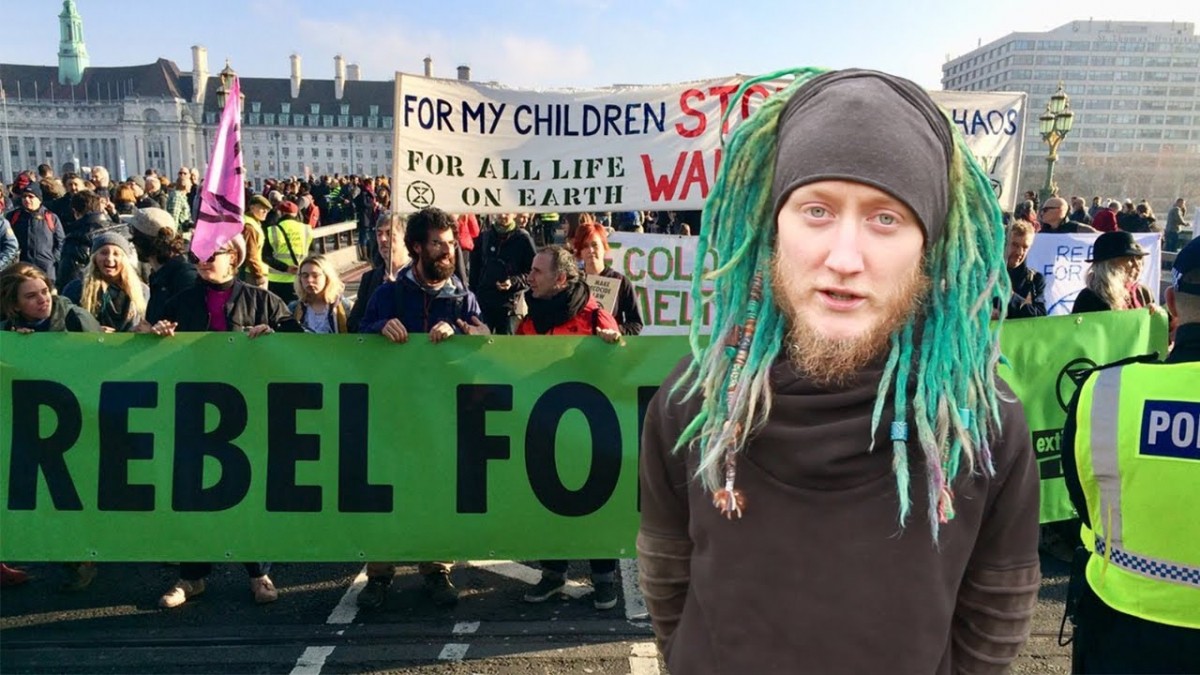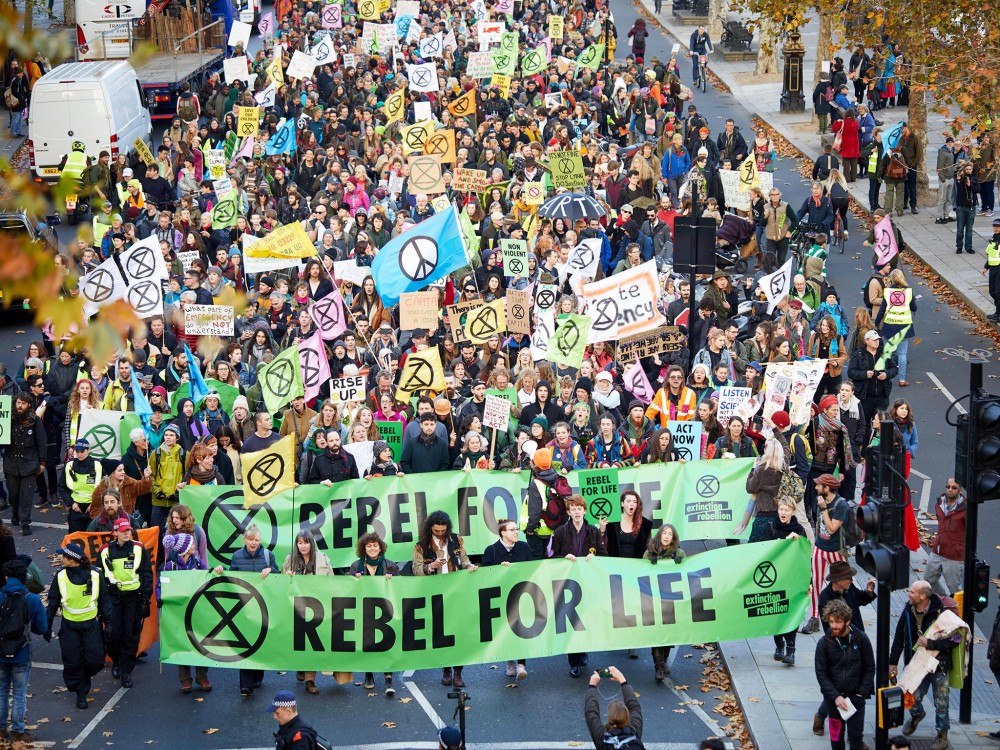
The movement known as Extinction Rebellion (XR) has pushed climate change firmly into the British consciousness, clearing the political hangover left by the never-ending Brexit fog. But there are constructive critiques to this monumental, London-centred climate activism that bear mentioning. Namely, what does this movement need to do to gather enough popular support and halt the ongoing climate meltdown.
XR takes over London
For 10 days in April, Extinction Rebellion created headline disruption, taking over prominent sites across London, including Parliament Square. They demanded that the UK government "tell the truth" about the scale of the climate crisis; enact legally binding policies to reduce carbon emissions to net zero by 2025; and do both through a Citizens Assembly (more on citizens assemblies here).
People last month participated in the tens of thousands, and many of then were new to activism. Holding these sites created space for public assemblies and direct action. When police arrested activists – more than 1,000 in total – more came forward until jail cells were full. Actions went far beyond London, from road blocks in Brussels to stopping a coal train in Australia, and die-ins as well as other actions from India to South Africa to Seattle.
Pressure from XR made Labour table a motion in Parliament to declare a climate emergency. The Welsh assembly did the same just days before. Now, as XR expands its effective activism globally, it is worth asking: what does this movement need to do to stop the climate catastrophe?
Next steps
Though XR secured a meeting with UK Environment Secretary Michael Gove, the encounter was deemed “disappointing”. Big surprise there. The XR approach – as set out by its founders – is to treat climate change as a moral not a political question. XR leaders think they can reason with those in power and they hoped to convince Gove to change UK government policy.
In reality, the UK acts primarily for vested interests – like big oil, banks, the arms industry and the rest of the 1% – which means that protests are about as unlikely to appeal to the government to prevent profiteers from driving us into climate oblivion as they are to bring about banking regulations or an end to wars.
Despite Parliament declaring a climate emergency, the UK government has not changed course. It continues to push for the expansion of Heathrow, Europe's largest airport, and drive disastrous fracking policies.
Since the climate catastrophe is being driven by capitalism, a highly carbon-intense system based on infinite growth, it is worth questioning whether XR's founders haven't quite yet "told the truth" about capitalism's prime role in the climate catastrophe. On April 22, the activist organization launched XR Business, a business venture promoted by 21 business leaders and this greenwashing firm.
The business leaders include Amy Clarke, who used to work at Bank of America, the fourth biggest bank-roller of fossil fuels worldwide. Responding to outrage from the grassroots, XR-Business closed its website in only two days.
XR has clearly grown beyond its founders' business-based ideas. To really push for systemic change over climate change, this evolution must continue.
There are alternatives
Extinction Rebellion ignores and neglects the political solutions to create a system that is not based on carbon-intense capitalism. To overcome this, the grassroots element of XR could showcase real alternatives already in action that could be scaled up.
Some examples are: community, cooperative and municipal renewable based energy; reducing energy consumption through measures such as retrofitting homes and mass transit; bans on fossil fuel extraction; protecting oceans and other wildlife habitat; and supporting small scale and organic agriculture.
Moving away from the XR-Business approach of providing greenwash for big corporations, the movement needs to showcase political systems that work for the climate. These include democratic confederalism in Rojava, the blossoming ideas of Green Municipalism and a Green New Deal.
Another problem with the XR founders' approach is the implied suggestion that climate change is everyone's fault equally. To deal with climate change, we must think about power – and this means shifting power to the people with decentralized renewable energy, and removing political power from those who sit at the top of the capitalist system. These are the people, after all, who have caused the climate crisis.
Since 2013, we have known that 90 corporations are to blame for 63 percent of cumulative global emissions. Big banks are underwriting the climate emergency. To rectify this situation we need to recognize it; we must call it out and tell the truth.
The growing broad awareness that there are climate perpetrators makes climate litigation cases more likely to succeed. Any climate movement serious about stopping a full climate catastrophe should be working with these cases.
This makes Extinction Rebellion's messaging – that climate change is all of our responsibility – a dangerous road to go down. But it can be adapted to say it is our collective responsibility to deal with climate change, and bring the climate criminals to justice.
Recognizing privilege
The flip-side is that we must also recognize climate victims. People in the global South have done little to cause the crisis yet they suffer the most. True climate justice means the 1 percent pay reparations to their victims.
XR initial messaging has talked about climate change as it affects middle-class, predominantly white people and “our children”. But it has also pushed a global climate justice angle, for instance, by spraying “Climate crime zone” on Shell HQ, where Farhana Yamin, a climate lawyer for the Marshall Islands, glued herself to the oil corporation's facility to highlight the fact that her islands could soon be wiped off the map by rising seas.
To really tell the truth about climate change, the rebels need to call out climate criminals. Anything else is a whitewash.
Also, the climate justice movement needs everyone. It should welcome everyone to participate. XR's ability to create a safe space for everyone has been questioned, not least by saying “We love you” to the police on the streets and in social media, omitting the force's institutional racism. Britain imprisons even more people of color proportionally than the U.S., and deaths in custody are rarely punished.
The first time white middle-class people open their eyes to police repression is when the violence threatens social movements. This is an everyday reality for swathes of people due to their class and ethnicity. The climate movement should reach out to these groups by not condoning the police.
Think globally, act locally
As a movement with demands aimed at the U.K. government, Extinction Rebellion has meanwhile succeeded in going global. But this means that it must evolve its critique towards global solutions.
One important means to stop our climate meltdown is by forming solidarity with indigenous groups. The majority of the world's richest ecosystems, the lungs of the planet, are the lands and waters of indigenous peoples. These areas are legally protected, but the laws are rarely enforced. The world must look to victories such as the Waorani nation, who have just won a legal battle to halt big oil's destruction of their ancestral Amazonian homelands.
We need many more of these victories. To adapt XR's messaging, what is clear is that there is no time to lose. The challenge is immense. We need to tell the truth. Capitalism is destroying the planet. Only with a monumental, intersectional and broad-based climate movement can we create the political and systemic change to make the world survivable.
















